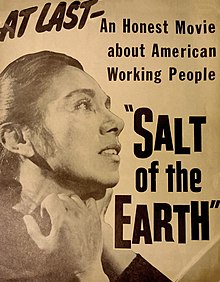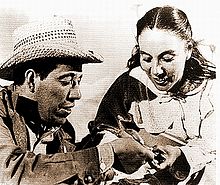Salt of the Earth **** (1954, Rosaura Revueltas, Juan Chacón, Will Geer, David Bauer, Mervin Williams, David Sarvis) – Classic Movie Review 11,884

Director Herbert J Biberman’s remarkable 1954 drama Salt of the Earth is a unique film about political struggle, which is itself the result of a political struggle. There is plenty of get angry about here.
This fictionalised true story of the successful 1951 13-month strike at the Empire Zinc Company zinc mine in Grant County, New Mexico, was the only project of the Independent Productions Company formed by blacklisted director Biberman and blacklisted producer Paul Jarrico to provide work to those denied it in Hollywood. The film uses neorealist style to show the conduct of the miners, the company and the police during the strike.
Sponsored by the International Union of Mine, Mill and Smelter Workers, it was written by blacklisted Michael Wilson, who won an Oscar for A Place in the Sun (1951) and The Bridge on the River Kwai (1957).
It features authentic performances from blacklisted Mexican actress Rosaura Revueltas as Esperanza Quintero, blacklisted Will Geer as the Sheriff, and David Bauer (as David Wolfe) as Barton, Mervin Williams as Hartwell and David Sarvis as Alexander (the film’s only five professional actors), along with the actual striking miners and their families. The male protagonist Juan Chacón, who plays Esperanza’s husband Ramon Quintero, was in real life a union local president.
Salt of the Earth is powerful and gripping, with a strong social and political view, and an attractive feminist viewpoint too.
The company is fictionalised as Delaware Zinc and the setting is Zinctown, New Mexico.
The film has been deemed culturally significant by the US Library of Congress and selected for preservation in the National Film Registry.
The copyright was not renewed in 1982 so the film is in the public domain.
It was harassed during production in New Mexico in 1953, edited in secret and stored for safekeeping in an anonymous wooden shack in Los Angeles, and languished for 10 years after its 14 March 1954 opening night in New York City and all but 12 US cinemas refused to screen it.
Biberman became one of ten Hollywood writers and directors cited for contempt of Congress and was imprisoned in the Federal Correctional Institution at Texarkana for six months and then directed this film. Biberman’s membership in the Director’s Guild of America, cancelled in 1950, was restored in 1997. He died on June 30, 1971, aged 71.
Pauline Kael reviewed the film for Sight and Sound in 1954 as ‘a simplistic left-wing morality play, as clear a piece of Communist propaganda as we have had in many years.’
© Derek Winnert 2022 Classic Movie Review 11,884
Check out more reviews on http://derekwinnert.com


